Review: A Delightful, Reimagined PETER PAN Musical Flies Into OC's Segerstrom Center
Featuring a star-making turn by OC native Nolan Almeida, this reworked classic directed by Lonny Price is filled with refreshing diversity and endearing silliness.
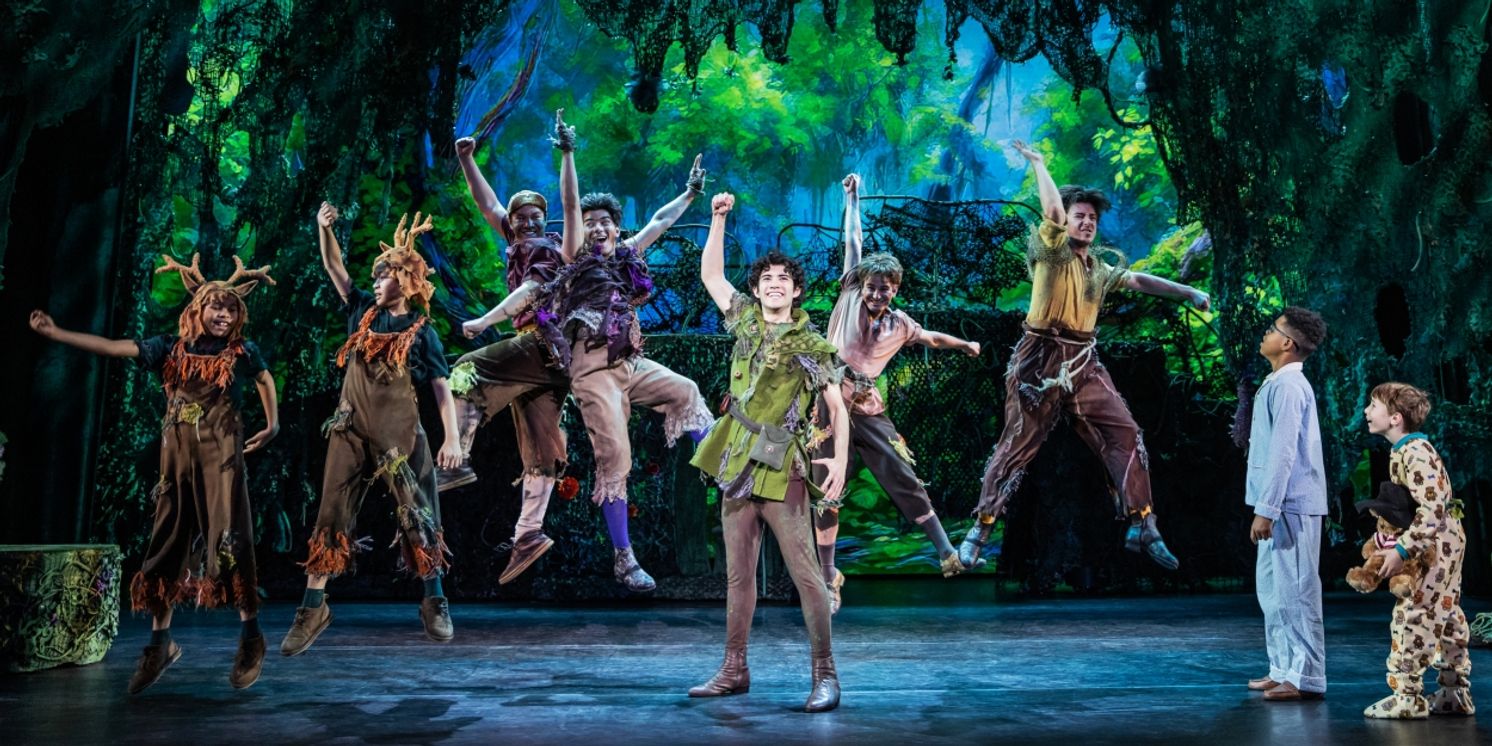
Admittedly, the 1954 Broadway musical version of J.M. Barrie's 1904 play PETER PAN is just about the last show I would have expected to get a dazzling, reimagined treatment for the 21st century, but… here we are.
And, you know what, I think many people will welcome the change.
Aimed at offering a timely, more progressive framework that tweaks the infamous story of the magical boy who never wants to grow up, this admirable revised version—featuring a heavily revised book by Native American playwright Larissa FastHorse and is directed by Broadway vet Lonny Price—reflects a purposefully modern approach to the classic story, attempting to balance the original's charm and whimsy with more contemporary sensibilities.
This all-new national touring company is currently at OC's Segerstrom Center for the Arts in Costa Mesa, where it continues performances through August 18, 2024.
Per usual, the central beacon of PETER PAN is its renowned title character, here played by the talented, very likable 17-year-old OC native Nolan Almeida. Portraying the young boy who doesn't want to grow up, Almeida is quite a discovery, blessed with a pleasingly beaming personality, an incredible singing voice, and an infectious verve and enthusiasm that bursts through right from his first appearance as he tries to find his lost shadow, then subsequently enchant the three Darling children in their shared nursery and convinces them to join him in his adventures.
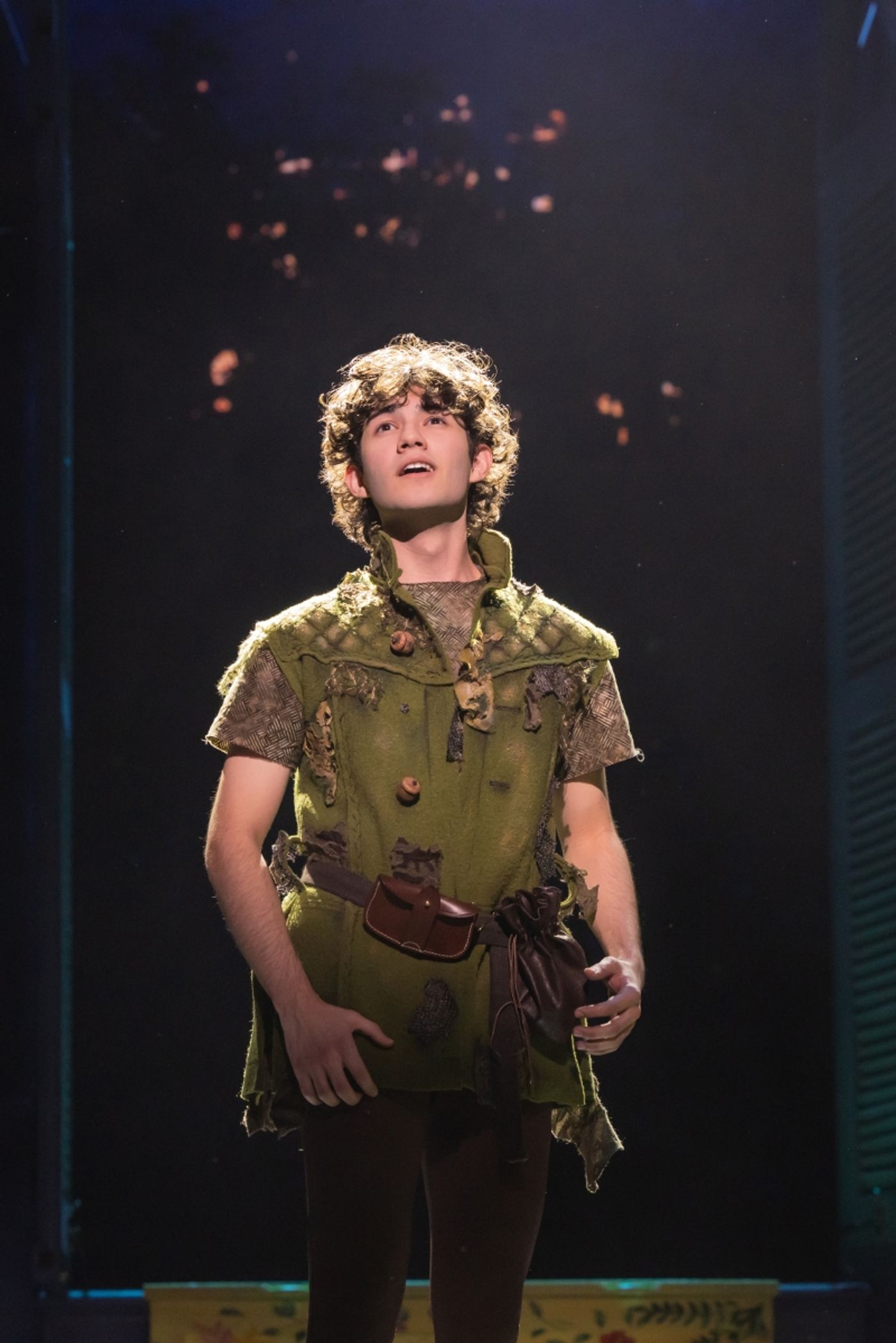
Photo by Matthew Murphy.
Ironically, the young actor actually appears more seasoned than his age seems to suggest. Singing, acting, and doing acrobatic flips in the air and on the ground, this energetic teenager is, to put it simply—really, really good at this. Almeida possesses a natural charisma and a youthful zeal, yet sings and acts like a seasoned pro. His performance, actually, has a lot to do with the show's overall enjoyment.
Historically, of course, the role of Peter has primarily been played by women—most famously, of course, original Broadway Peter Pan Mary Martin and, later, Sandy Duncan in its later revival. And logging in, perhaps, the most frequent flyer miles in the role is former Olympian Cathy Rigby—who happened to be in the role the last time I saw this musical, funny enough, at her home theater in La Mirada.
But Almeida's exemplary work in this production certainly makes the case for casting not only an actual young teenager in the role, but also to show that the role is benefitted by casting someone that closely resembles how the character should look and act (think Disney's, arguably, definitive version of the boy who can fly, but in actual human form).
The rest of the cast is pretty great, too, from Peter's deliciously diabolical arch nemesis Captain Hook, played in the hammiest, most wonderfully queerest fashion by Cody Garcia, to the more self-sufficient, more empowered version of Wendy Darling, played by the marvelous, lovely-voiced Hawa Kamara. I also enjoyed Raye Zaragoza's reimagined Tiger Lily, a sort of spunky, rebel alliance leader-type who happens to sound like an American Idol champion.
Other standouts include the hilarious Kurt Perry as Hook's Man-Friday Mr. Smee and the rest of the Darling clan that includes John played by William Foon, pint-sized Michael played by Camden Kwok, and Mrs. Darling played by Shefali Deshpande (Garcia also does double duty playing Mr. Darling at the beginning and end of the show, continuing the tradition of the original play). Collectively, the entire ensemble is excellent, particularly during rousing group numbers that incorporate the high-energy choreography by Lorin Latarro.
While the musical certainly retains its core narrative—Peter Pan's playful adventures with the Darling children in his magical realm called Neverland—this brand-new, non-Equity touring production's well-meaning major revisions often seek to address cultural sensitivities and update character portrayals for a 21st-century audience.
The results are slightly mixed, but they certainly tip much more towards the positive side of spectrum.
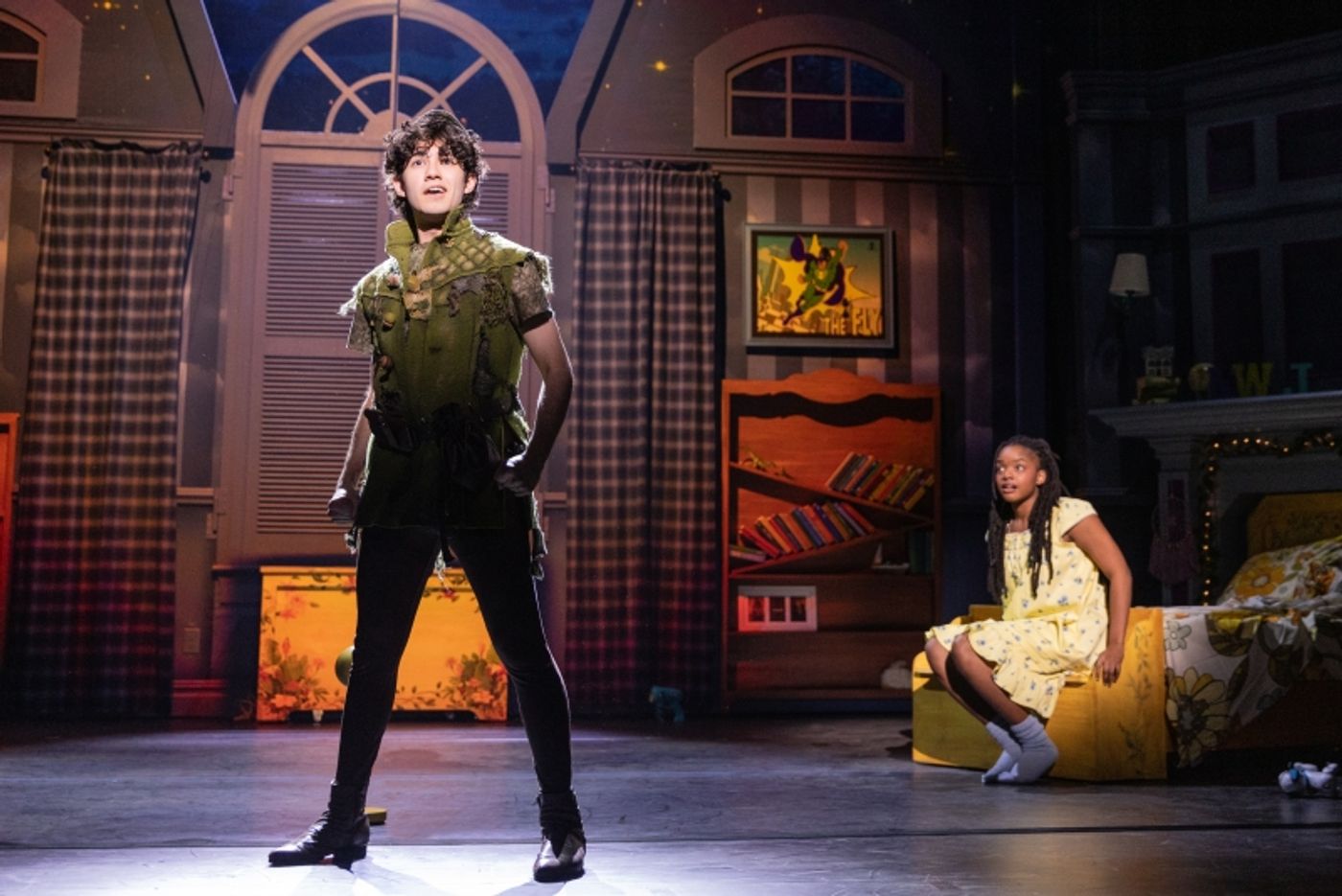
Much of the original musical's score—with familiar music by Morris Charlap and Jule Styne and lyrics by Carolyn Leigh, Betty Comden, and Adolph Green—is present in this new iteration, which will please existing fans of the show.
However, today's audiences will likely appreciate that one of the more objectionable songs from the original show, "Ugg-a-Wugg" has been rightly replaced by a new song called "Friends Forever," a reinvention of the song "Come Once In A Lifetime" from the 1961 Comden/Green/Styne musical Subways Are For Sleeping, with new lyrics contributed by Green's own daughter Amanda Green. The new song ends the first act with a celebratory party between Peter and his Lost Boys, their visiting friends, and Tiger Lily's band of island misfits that’s less ick than the previous song that disparaged Native American culture.
The switch-up, of course, is this new production's valiant attempt to erase the unfortunate racist overtones that existed in the original text, and to embrace new book writer FastHorse's goal to make the story incorporate identities that look and speak more like the world we live in today. Part of that is to do away with the original Victorian England setting of the Darling home and move them to present-day America (where the Darling children are watched over by a Bluetooth headphones-clad millennial babysitter instead of a St. Bernard).
Admittedly, this time/location switch is one of the few things that really took me a bit to get used to: the fact that the Darling family in this revised iteration sounds very California-American rather than British. The very British-ness of the original feels like a sacrosanct part of the PETER PAN lore, so it may take a bit of time (as it did for me) before those of us who've grown up seeing (and, well, hearing) prior characterizations with proper UK accents to acclimate to this new version (it's actually not that hard).
But perhaps one of the more notable changes for this 2024 version is its concerted effort to add more depth to its characters. Peter Pan, historically, has been portrayed as aloof and a little self-involved (as most man-child personas are, I suppose). Here, Peter is often portrayed with more nuance, highlighting a much more palpable fear of growing up and being genuinely afraid of the consequences of perpetual childhood. The gravity-defying kid even gets a new lament song in the form of "When I Went Home," a cut song from the original pre-Broadway production that has been restored in this new iteration to give Peter a bit more grounded gravitas.
Newly feminist Wendy, in particular, is given more agency and complexity, evolving from a play-acting mother figure to a smarter, instinctual character with her own desires and ambitions (her "motherly" nature is tied to her aspirations to go to medical school). And though she's clearly enamored by Peter and his magical abilities, she also knows what she wants and will never let a boy dictate what she should or should not think or do. You go, girl!
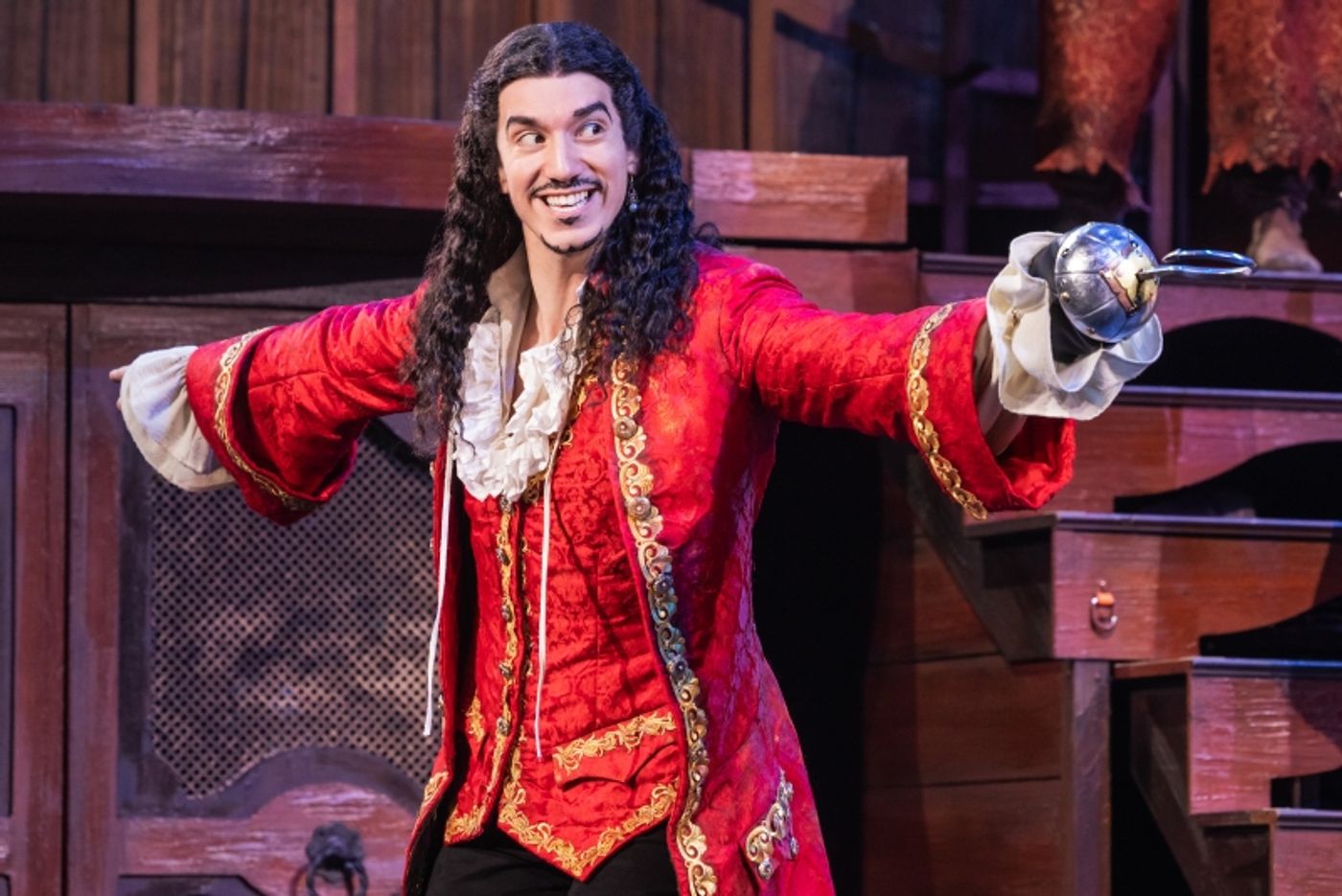
In addition to this attitude shift, the show's updated dialogue (mentioning mobile phones, pop culture, and even social media) helps the story feel more accessible to contemporary audiences, with humor and references that resonate with modern sensibilities. Themes such as gender roles, the importance of family, and the struggle between youth and maturity are explored with much more introspection and sophistication.
And, of course, one very significant and positive change in the revised musical is its treatment of the former Native American characters—particularly Tiger Lily and her fellow native Neverland-ers that the original story referred to as "Indians" (the Disney adaptation even called them "Red Skins.") Their portraits in the original versions were indisputably problematic, relying on offensive, very dated stereotypes. This newly reimagined production presents these characters with more respect and authenticity, even introducing Tiger Lily's "tribe" as a collection of distinct individuals from different backgrounds, made up of expats from various cultures, backgrounds, and gender identities that have formed a found family here in their new home at Neverland. Each of them, we learn, are the last of their breed and have come here to keep their traditions alive.
But, visually, what is particularly impressive is this revised production's use of much more advanced stage technology, making the flying scenes (choreographed by Paul Rubin) more dynamic and fantasy-like and the magical elements generally more impressive, thanks to some innovative animated projections by David Bengali, storybook-inspired sets by Anna Louizos, and brilliant lighting by Amith Chandrashaker. This definitely enhances the audience's theatergoing experience with the classic story, especially those versed in theatrically-magical modern shows like WICKED or the recent CINDERELLA revival. Here, the fantastical elements of Neverland come to life in new and exciting ways.
Musically, the show sounds terrific. Not only does the classic score sound amazing (under the baton of music director Jonathan Marro), but the sound balance for this show has vastly improved over recent musical tours that have visited Segerstrom Center (you can finally hear dialogue and lyrics quite coherently!).
Alas, with the risk of adding complexity in character development, story tweaks, and additional themes, the pacing of the revised musical can sometimes feel uneven, especially when many sequences amp up some of the more erratic moments of chaos and playfulness. Attempts to delve deeper into characters' backstories or explore modernist themes can at times also slow down the still old-school narrative, particularly since PETER PAN, at its core, involves a narrative that thrives on the briskness of child-like adventure and discovery.
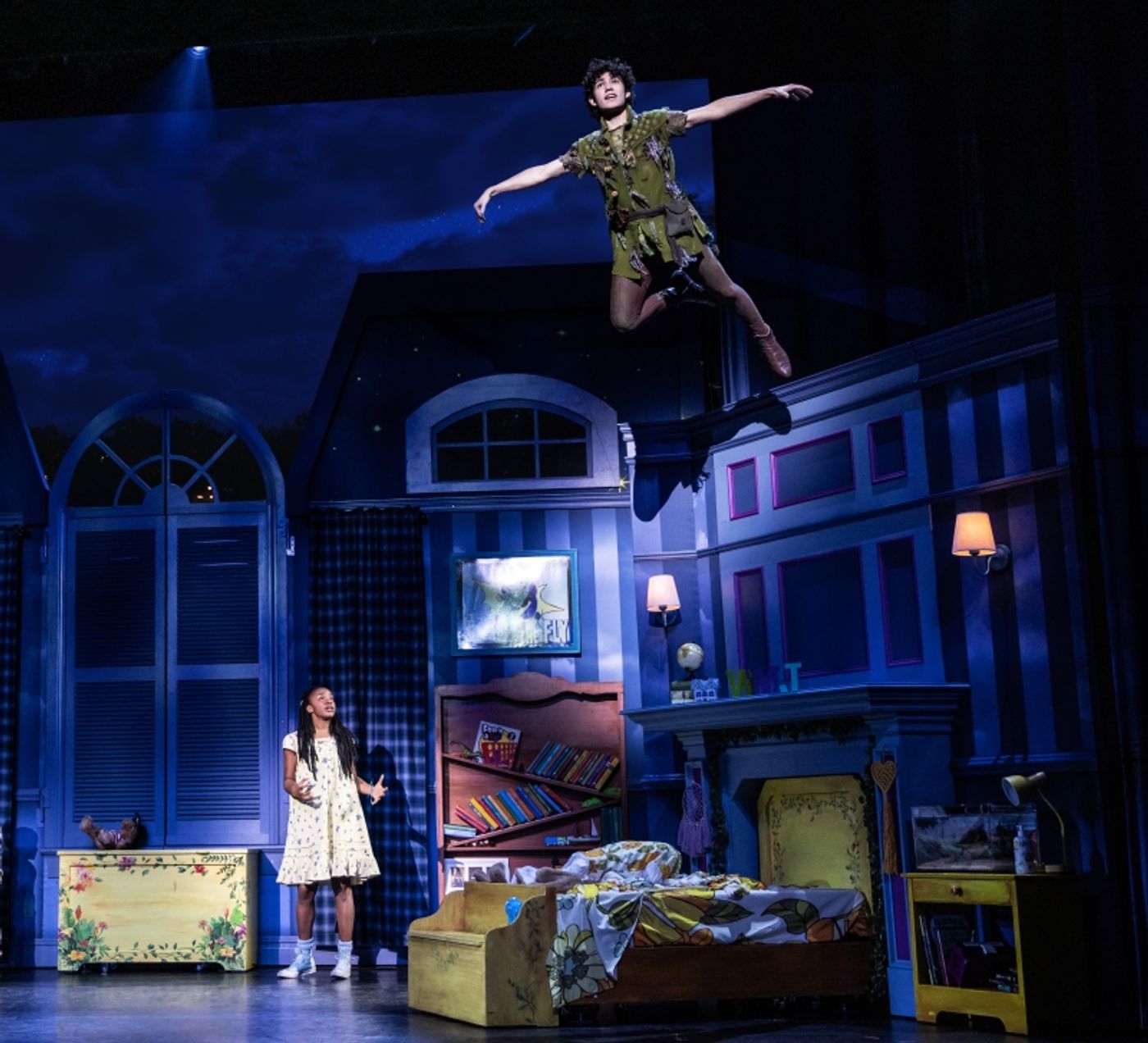
In summary, this revisionist PETER PAN - THE MUSICAL is, in the sum of its parts, a thoughtful and mostly successful update to a beloved, familiar classic. The show certainly offers a more inclusive and reflective version of the story, while still aiming to capture the magic and wonder that have made Barrie's story such a timeless favorite. However, it does face the challenge of trying to satisfy both new audiences and long-time fans, navigating the tightrope between innovation and tradition—which, I feel, the show definitely fulfills. And with the extremely likable newcomer Almeida flying high above us, you can't help but walk away smiling… and crowing.
* Follow this reviewer on Twitter-X / Instagram / Threads: @cre8iveMLQ *
-----
Photos by Matthew Murphy, courtesy of Segerstrom Center for the Arts.
Performances of PETER PAN - THE MUSICAL continue at Segerstrom Center for the Arts in Costa Mesa, CA through August 18, 2024. Tickets can be purchased online at www.SCFTA.org, by phone at 714-556-2787 or in person at the SCFTA box office (open daily at 10 am). Segerstrom Center for the Arts is located at 600 Town Center Drive in Costa Mesa. For tickets or more information, visit SCFTA.org.
Photo Credit: Matthew Murphy
Reader Reviews
Videos

